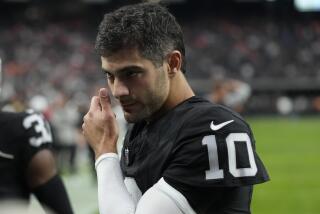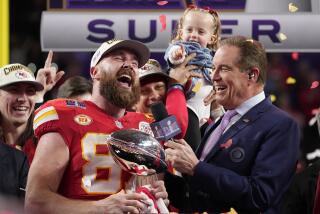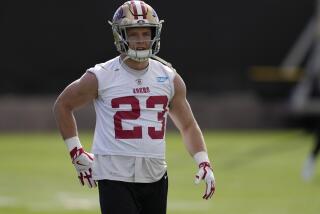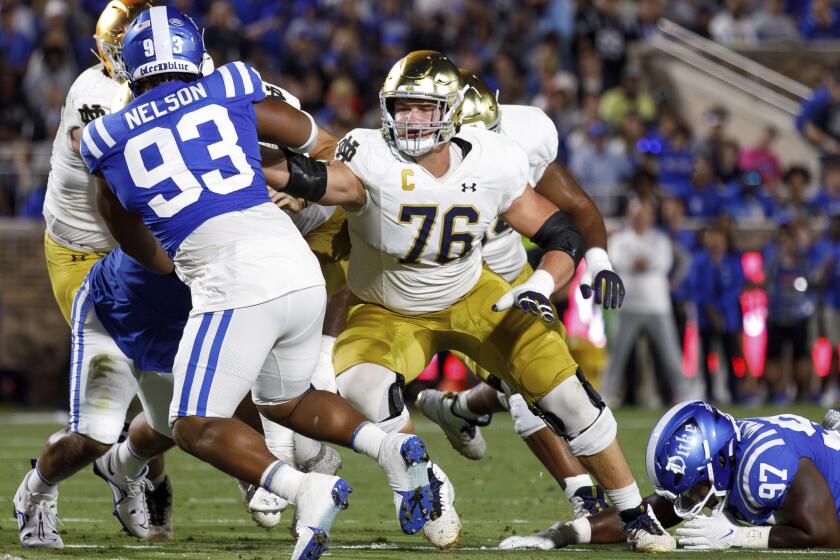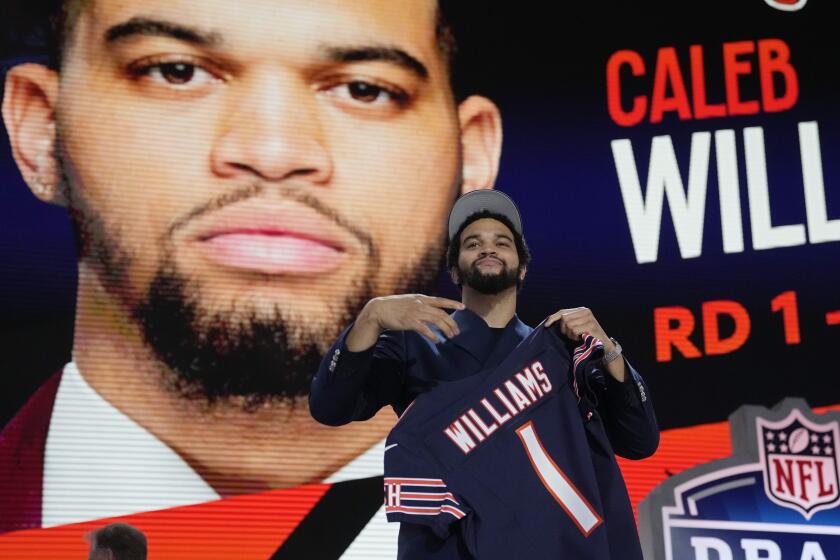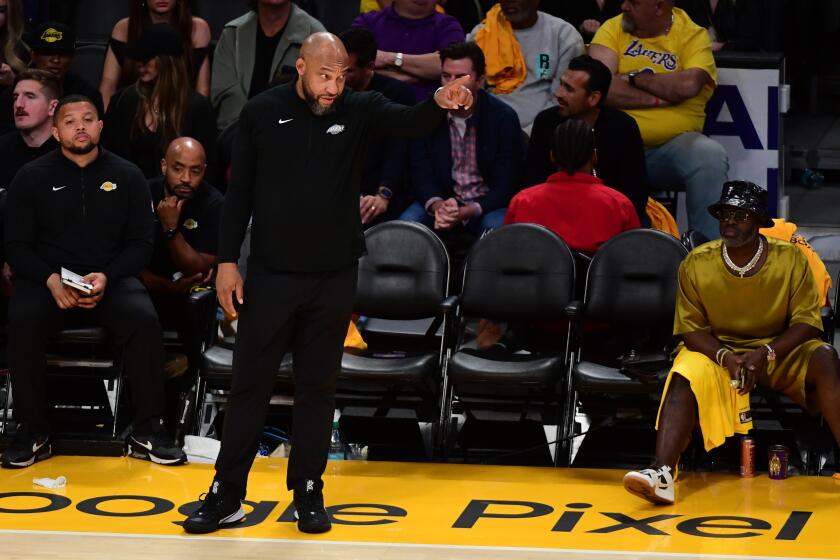Quarterback change reiterates that NFL is foremost a business
The NFL is a business.
Easy to say. Hard to swallow.
Nowhere was that more evident this week than in San Francisco, where Alex Smith officially lost his starting quarterback job to Colin Kaepernick, who had filled in for him after Smith suffered a concussion last month against St. Louis.
In the eight quarters that preceded that injury, Smith completed 32 of 35 passes for 385 yards with five touchdowns, a pass intercepted, and a passer rating of 140.2. In other words, he had more touchdowns than incomplete passes.
Smith vented to reporters this week — as much as this good soldier vents — conceding, “It sucks, I don’t know what else to say.”
But he was able to find more words.
“You state your case with your play,” he said. “I feel like I’ve done that. I feel like the only thing I did to lose my job was get a concussion.”
Smith didn’t lose his job, per se. It was pried from his grasp by Kaepernick, a physical specimen who was too sharp to ignore in directing wins over Chicago and New Orleans.
Whereas Smith is very solid, doesn’t make many mistakes, and puts the team in the right positions to win, Kaepernick has more mobility, an outstanding arm, and has greater potential for explosive plays. That’s something the 49ers lacked last season, when they got to the doorstep of the Super Bowl before their offense ground to a halt in the NFC championship game against the New York Giants.
Still, but for a fumbled punt return in overtime, it might have been San Francisco playing New England for the Lombardi Trophy. Smith exceeded all expectations by leading the team to a 13-3 record in the regular season, coming through with a clutch touchdown run and pass against the Saints in the divisional round, and essentially erasing all those years of disappointment since the 49ers made him the No. 1 pick in 2005, choosing him over Aaron Rodgers.
What did Smith earn for that? A whole lot of uncertainty. The 49ers made a strong run at Peyton Manning in the off-season — no matter how they portrayed it later — and now, at 8-2-1 with a 2 1/2-game lead in the NFC West, have put the ball in Kaepernick’s hands for Sunday’s game at the Rams.
And there’s nothing wrong with that. It’s a cold reality of a harsh business. Noble as it is to say that no one should lose a job because of an injury, that’s not realistic. There’s too much at stake with every game. Football truly is a business, and if Coach Jim Harbaugh thinks that’s the best decision, well, that’s his job.
“I don’t believe the old adage that you don’t lose your job because of an injury,” former NFL quarterback Rich Gannon said. “I think that’s nonsense. I don’t know where that ever came from. That doesn’t make any sense. This is a business based on production and availability.
“I’d say your best ability as a quarterback is availability.”
Gannon, for one, can see both sides of the argument. He doesn’t take issue with Harbaugh, and he knows how it feels to be in Smith’s position.
In 1992, with Gannon at quarterback, the Minnesota Vikings were 8-3 and leading the NFC Central. He had taken a lot of hits, and missed part of one game with a hyperextended knee. Still, he was gritting through it.
So it was a complete surprise after a Week 12 victory over Cleveland, when first-year coach Dennis Green benched Gannon in favor of Sean Salisbury.
“The head coach didn’t even tell me,” said Gannon, now a CBS analyst. “Never talked to me about it. Never even addressed it with me, just had the offensive coordinator come to me on a Monday and say, ‘We’re going to make a change.’ Not only that, he said, ‘It’s not going to be permanent. We’re just going to make a change. You’ve been getting hit a lot, and we’re just going to get the other guy in there, get you healthy, and get you back in there.’”
With Salisbury under center, the Vikings beat the L.A. Rams and lost at Philadelphia — and Gannon’s football world turned upside down. Teammates avoided him because they didn’t know what to say. He went from being The Man at practice to a guy looking to get a few reps here and there with the scout team. Suddenly, he was on the outside looking in, and his confidence plunged.
“It’s not as easy as people think: ‘Oh, yeah, if he struggles, then you go back to Alex,’” Gannon said. “Well, if you go back to Alex, he may not be the same guy. That’s the one danger — if this kid gets hurt or struggles over the next month …
“In meetings, every time there’s a question or a comment, it’s, ‘Hey, Alex, if we get an overload here, we want you to get into this play.’ Now, it’s, ‘Hey, Colin…’ It’s a really weird experience to go through.”
Gannon returned during a game against San Francisco in Week 15, a game the Vikings lost for their first consecutive defeats of the season. They were heading in the wrong direction at the time when they should have been making a strong stretch run.
“When they put me back in there, it wasn’t good,” he said. “Then the guys look at you different. You don’t have the trust of your teammates. You’re struggling, trying to make a big play.”
Minnesota went back to Salisbury after the loss to the 49ers, won their final two games, then were wiped out at home by Washington, 24-7, in the first round of the playoffs.
The way Gannon sees it, Green’s decision to fiddle with the quarterbacks altered the delicate balance of the season and doomed the team.
“We were a good football team,” he said. “We were going to win the NFC Central [which they ultimately did]. We were walking away with it. It was a rookie head coach who made a terrible decision.”
There’s definitely a potential downside to the 49ers making their quarterback change. It could be brilliant. It could be a mistake. Certainly, it’s a leap of faith.
What we can’t know now is, if the 49ers circle back and come knocking for Smith, will the same Alex be there to answer?
twitter.com/LATimesfarmer
More to Read
Get our high school sports newsletter
Prep Rally is devoted to the SoCal high school sports experience, bringing you scores, stories and a behind-the-scenes look at what makes prep sports so popular.
You may occasionally receive promotional content from the Los Angeles Times.
